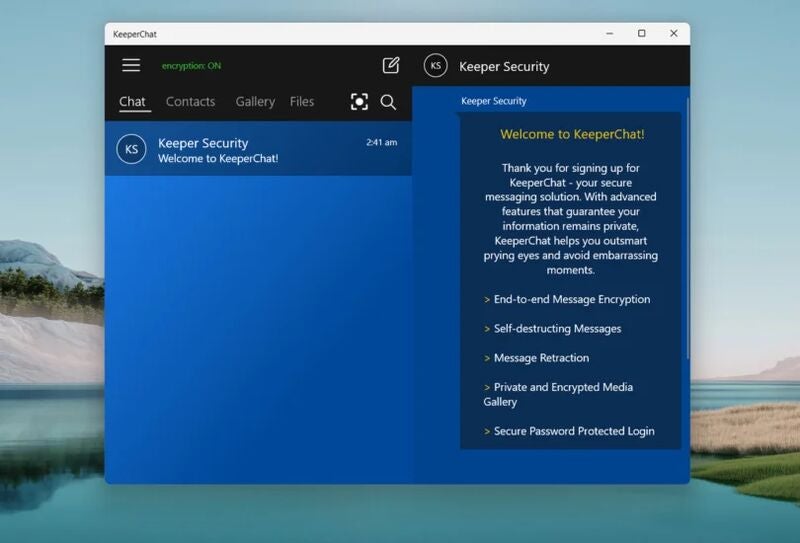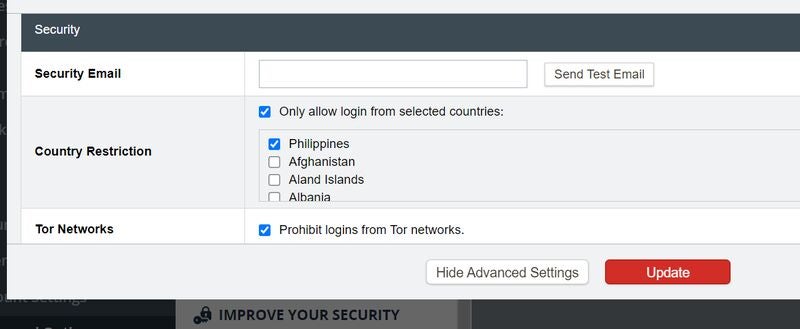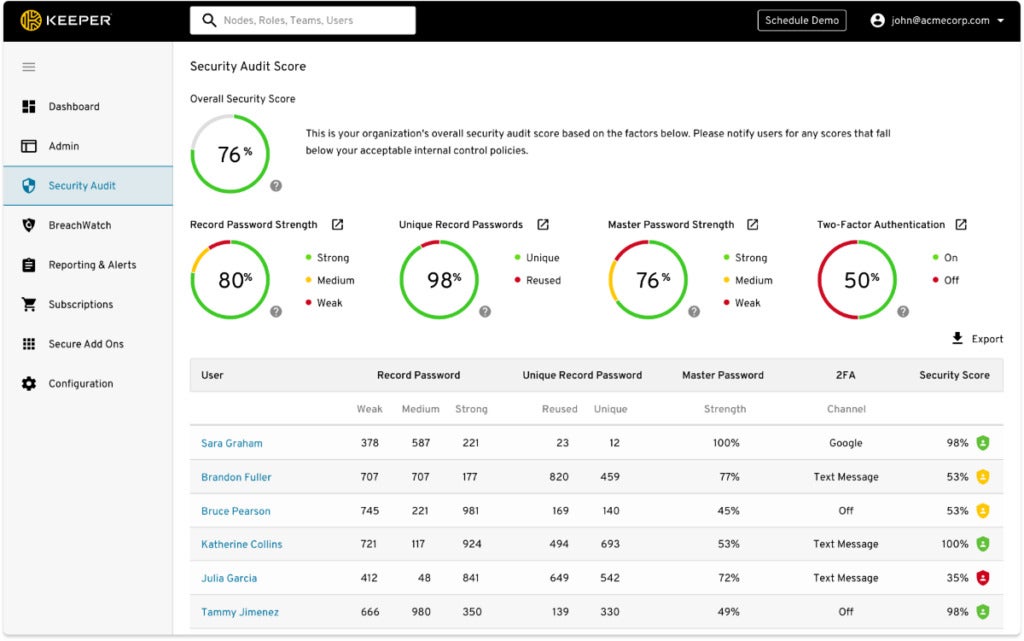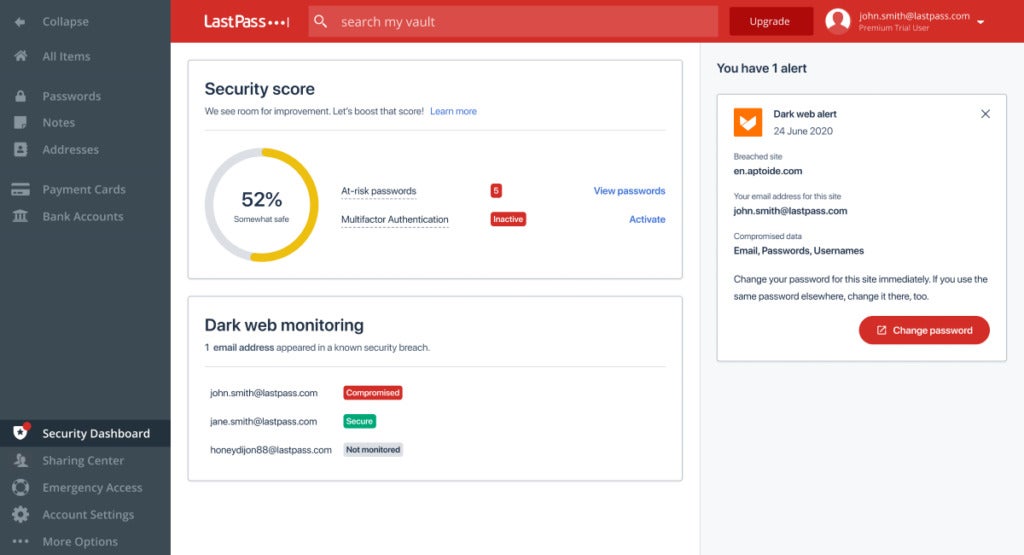Keeper and LastPass are two popular password managers that act as encrypted vaults for all your credentials. They also offer additional features such as password generation, multi-factor authentication and password sharing.
SEE: 10 Myths about Cybersecurity You Shouldn’t Believe (TechRepublic Premium)
Keeper shines for its impressive security and business-centered features. LastPass, on the other hand, is hampered by recent data breaches despite its generous free version and easy-to-use software.
With that being said, let’s compare Keeper and LastPass to see which one is best for you and your organization.
Keeper vs. LastPass: Comparison table
| Features | ||
|---|---|---|
| Star rating | ||
| Zero trust principles | ||
| Multi-factor authentication | ||
| Adherence to information security standards | ||
| Encryption | ||
| Unlimited password storage and sharing | ||
| Business add-ons | ||
| Supported Platforms | ||
| Starting price | ||
Keeper and LastPass pricing
Keeper and LastPass have similar pricing for their individual subscriptions — with Keeper Personal at $2.92 per month and LastPass Premium at $3 per month, both billed annually. For Family plans, LastPass is more affordable at $4 per month than Keeper’s $6.25 per month.
For their business plans, Keeper and LastPass offer comparable prices, but Keeper presents more options:
- Keeper’s Business Starter plan for $2 per user per month is good for up to 10 people and a minimum of five users.
- Keeper’s Business plan priced at $3.75 per user per month is good for small-to-medium sized businesses.
- Keeper also has the Enterprise plan that offers customized bundles and pricing.
In comparison, LastPass offers two business subscriptions divided into a Teams and a Business plan:
- LastPass Teams is $4 per user monthly for 50 users or fewer.
- LastPass Business is $7 per user monthly, allowing an unlimited number of users.
LastPass and Keeper both offer free tiers; however, features are limited compared to their paid subscriptions. Keeper’s free version is only available on its mobile app and on a single device. On the other hand, LastPass’ free version is more generous in that it allows an unlimited number of passwords stored for one device — accessible on both desktop and mobile.
While it’s clear that LastPass’ free version is better, its recent data breaches make it hard for me to recommend it over Keeper.
SEE: Top 6 LastPass Alternatives and Competitors for 2024 (TechRepublic)
Both offer free trials, with Keeper offering 30-day trials to all its plans and LastPass having a 30-day trial for its Single and Family tiers and 14-day free trials for its Teams and Business subscriptions.
As far as discounts, Keeper offers a generous 50% discount for students and a 30% discount to former military personnel and their family, first responders, law enforcement and healthcare workers.
Feature comparison: Keeper vs. LastPass
Overall security and encryption
For overall security, I have to give it to Keeper. This is largely due to LastPass being involved in two data breach incidents back in 2022.
The first breach involved a software engineer’s corporate laptop being compromised, which exposed sensitive source code and technical information. The second incident affected customer vault data itself, with both encrypted and unencrypted customer data getting leaked.
While LastPass assured users their encrypted files are secured with military-grade 256-bit AES encryption, this was still only if they carried out password best practices for their master password.
If you want to learn more about LastPass’ recent breaches, check out our full LastPass review here.
On the other hand, Keeper uses the same AES-256 encryption but has yet to be involved in any sort of data breach or attack. This is what we want to hear when it comes to password managers — especially since they’re supposed to store some of our most essential personal information.
I must mention that LastPass has implemented changes in response to the data breaches. These include security and privacy changes within their service, as well separating from parent company GoTo and shifting to independent ownership in 2024.
Despite this, I still feel that most businesses should opt for Keeper. With sensitive data such as passwords, a clean track record is critical, and among the two, Keeper is the better choice.
Standout security features
LastPass and Keeper have unique features that set them apart from other password managers. Keeper offers an encrypted messaging service called KeeperChat. It’s free for all Keeper Personal users and provides end-to-end encrypted messaging and fingerprint-protected private messages.

While I personally don’t envision myself using this type of service, it’s nice that Keeper offers it as an option. It may be useful for incredibly sensitive communications and or file sharing — which businesses may want to avoid doing on less protected platforms.
Meanwhile, LastPass has its Country Restrictions feature, which enables users to only allow access to selected logins in countries of their choice.

I find this really useful for businesses that regularly go on overseas trips and want a simple way to secure sets of passwords in a pinch.

Both password managers alert users when their log-in credentials may have been breached. Keeper offers a feature called BreachWatch, which alerts users when stolen usernames and passwords match the user.
In contrast, LastPass offers a dark web monitoring feature that evaluates all stored email addresses in vault items. It immediately alerts users if any client email addresses are found in the database of breached credentials.

Zero trust and multi-factor authentication
Keeper and LastPass both employ a zero-trust security model, meaning they never assume users are who they say they are. Instead, users are constantly verified through multiple layers of security.
In terms of two-factor authentication, LastPass and Keeper offer several methods, including biometrics, one-time codes and push notifications. However, I find that LastPass’s multi-factor authentication support is often limited or unavailable when federated login is used, while Keeper supports consistent MFA access via SSO Connect.
Adherence to information security standards
ISO 27001 and SOC2 are two of the most popular standards for information security. ISO 27001 checks if a system has an effective information security management system, while SOC2 ensures that providers store and process customer data securely. These certifications are important indicators of the security and quality of a password manager.
In this aspect, I commend both Keeper and LastPass for having achieved certifications for these standards. It is worth mentioning that out of the two, Keeper has enjoyed a longer period of SOC2 and ISO 27001 certification.
General password management features
Keeper and LastPass have robust administrative controls, allowing users to easily add, edit and delete passwords as needed. They both allow importing passwords from other applications, such as Google Password Manager. In their premium versions, Keeper and LastPass also offer unlimited device access, password sharing and priority 24/7 customer support.
Both password managers have emergency access that allows a loved one or a designated user to access the primary account holder’s information if something happens to them.
We get unlimited password storage and unlimited secure cloud backup in Keeper and LastPass. In addition, both managers are able to generate random secure passwords, which saves you time from thinking about combining numbers, texts and symbols for better security.
While they carry similar features, there are differences between Keeper and LastPass. For example, LastPass users can turn off the password manager for specific sites, while Keeper users cannot. This is advantageous if there are specific sensitive websites where users prefer to remember their passwords rather than use a password manager.
Otherwise, I found the two password managers to be very similar in terms of their general password management functionality.
Business add-ons
Keeper offers a few more options than LastPass when it comes to business-specific add-ons. Its business add-ons include the Advanced Reporting and Alerts Module, Compliance Reports, the Keeper Secrets Manager, secure file storage and sharing and private hyper-secure messaging via KeeperChat.
For businesses with scaling needs, I think Keeper is a better choice given its various add-ons and additional services.
LastPass does allow you to purchase two add-ons for their Business tier: Advanced SSO for $2 per user monthly and Advanced MFA for $3 per user per month.
Supported platforms
Keeper and LastPass include support for a wide range of platforms. The two password managers are available on Windows, Mac, Linux, Android, iOS, Chrome, Firefox, Safari, Edge and Opera.
Keeper pros and cons

Pros of Keeper
- Offers a free version.
- Offers a wide range of features, including auto-fill, two-factor authentication and password sharing.
- User-friendly interface.
- Compatible with multiple client devices and formats, including desktop, mobile, browser and command line.
- Encrypts user data with military-grade AES 256-bit encryption and multiple layers of security.
- Allows users to generate strong passwords.
- Easy to share and sync logins among multiple devices.
- Includes dark web monitoring.
Cons of Keeper
- Advanced two-factor authentication is not available in Business Starter and Business plans.
- Single sign-on (SAML 2.0) authentication is only available in the enterprise plan.
LastPass pros and cons

Pros of LastPass
- Offers a free version, in addition to premium subscriptions.
- Offers over 1,200 pre-integrated SSO apps.
- Easy-to-navigate user interface.
- Allows users to generate strong passwords.
- Easy to share and sync logins among multiple devices.
Cons of LastPass
- Security concerns after recent data breaches.
- Customer support could be improved.
- Can be expensive for larger organizations.
Should your organization choose Keeper or LastPass?
As much as LastPass is a decent password manager in its own right, it’s clear that Keeper is the better choice. LastPass’ recent data breaches make it hard to recommend it as a viable password manager at this time. The risk simply isn’t worth taking, even as LastPass has tried to rebuild trust with its users.
Not to mention the fact that Keeper is a top-tier password manager itself, providing solid encryption, a user-friendly interface and thoughtful business add-ons to its service.
It also has a clean track record and convenient discounts for students and military and medical personnel. If you want more in-depth analysis on Keeper, check out our full Keeper review.
While LastPass’ free version can be a good choice to test drive a password manager for free, I still think it isn’t the best option as a password management solution long term.
Methodology
This article was originally written by Kihara Kimachia and was updated by Luis Millares.
My comparison of Keeper and LastPass involved an extensive analysis of their features, price and value for money. This includes looking into each product’s track record, password management system and included security features, among others.
I also carefully assessed how each provider’s features translated into real-world benefits, taking into consideration use cases for both individual users and businesses alike.

